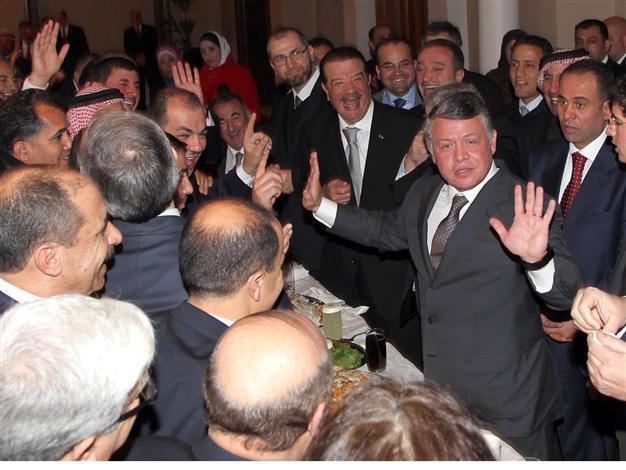King Abdullah: Arab Spring past threshold
ISTANBUL - Hürriyet Daily News

Jordanian king praises the Arab Spring and says the region have crossed the turning point and there is no going back on the legitimate demands of the people. He also suggest reviving the Mid East peace process may avoid a standoff with Iran
The Arab Spring was “a much-awaited opportunity to overcome internal resistance to change and embark on an unprecedented political reform process,” according to King Abdullah II of Jordan, who gave an exclusive interview to the Turkish Policy Quarterly's Diba Nigar Göksel.The Jordanian ruler was among key figures interviewed by TPQ, which is celebrating its 10th anniversary this year.
Though embracing the change brought by the Arab Spring, King Abdullah, 50, also noted the presence of “big question marks” such as the Syrian crisis and its potential consequences for Iran, Hamas, Hezbollah and Iraq.
“In the short term, some countries may be passing through an Arab winter before their Arab spring blossoms into an Arab summer,” King Abdullah said, responding to questions from TPQ. “But what counts is that we have crossed the turning point. There’s no going back on the legitimate aspiration of the people to have a larger say in the way their societies are organized.”
King Abdullah, who ascended to the throne in 1999 after the death of his father, King Hussein, said that in the long term he was “confident we will all look back at the Arab Spring and agree that it was a good thing and that it made life better for many Arabs.”
“I trust we will eventually see the emergence of vibrant and engaged civil societies, more pluralism, democracy, justice, and equality in the Arab world,” he said, adding that the European Union and the United States had a “moral duty” to “assist and support nascent Arab democracies.”
Regarding his January meeting with Hamas leader Khaled Mashaal, the Jordanian ruler rejected speculation, emphasizing Hamas “will not reopen offices in Jordan.”
Uncertainties around Syria
On the Syrian situation, King Abdullah said it was currently “impossible to predict how the situation will evolve and fully and comprehensively assess its ramifications on Iran, Hezbollah, Hamas, Iraq and all other players and countries in the Middle East.”
“The only certain thing is that the Syrian crisis is placing new burdens and responsibilities on the neighbors, namely both Turkey and Jordan, starting with looming prospects of a humanitarian emergency,” he added.
In order to defuse any future standoff with Iran, the revival of the Middle East peace process was a must, according to the king. “This unresolved conflict offers a rallying point for any entity wishing to gain the emotional support of over 1 billion Muslims around the world,” he said.
To read the full interview, click here.
















